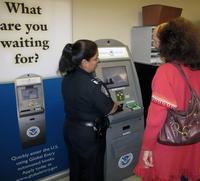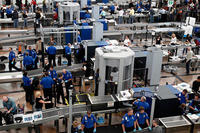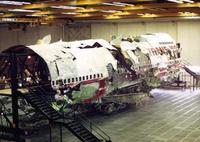-
TSA to promote PreCheck program for travelers
In an effort to make airport security lines shorter and move faster, the Transportation Security Administration (TSA) will allow passengers to apply for expedited airport screenings. TSA says the plan is for 25 percent of U.S. travelers to be eligible for the system by the end of this year, and 50 percent by 2014.
-
-
FAA to toughen co-pilot qualifications requirements
In the aftermath of a 2010 crash of a regional airliner near Buffalo, New York, which killed fifty people, the Federal Aviation Administration (FAA) has developed new standards for co-pilots. These new standards will now be imposed.
-
-
New program whisks passengers through airport security

A new system has been introduced to get passengers through airport security faster. The program, called Global Entry, was developed by the Customs and Border Patrol (CBP) and it offers a new way to avoid customs and immigration lines.
-
-
FAA wants pilot convention to pay for air-traffic control services
The Federal Aviation Administration (FAA) told the Experimental Aircraft Association (EAA) that it – the EAA – would have to pay for air traffic control services during the EAA’s big AirVenture event in Oshkosh, Wisconsin. The EAA asked a court for a judicial review of the FAA request, arguing that the FAA’s demand amounts to imposing a user fee on the pilots who take part in the event – pilots who already pay fuel taxes which fund the national air-traffic control system.
-
-
Study shows TSA security screeners are methodical, not slow

A study by Duke University, partially funded by DHS, found that TSA screeners may be slower than amateur screeners when it comes to performing visual searches, but the TSA screeners are better at detecting contraband.
-
-
U.S. ports vulnerable to cyberattacks
New study says that the U.S. largest ports are vulnerable to cyberattacks.The study argues that the level of cyber security awareness and culture in U.S. port facilities is relatively low, and that a cyberattack at a major U.S. port would quickly cause significant damage to the economy.
-
-
Highly portable X-ray imaging system developed
Los Alamos National Laboratory and Tribogenics have developed the MiniMAX (Miniature, Mobile, Agile, X-ray) camera to provide real-time inspection of sealed containers and facilities.MiniMAX is an alternative to the large, expensive, and fixed facilities presently required for security inspections using X-ray imaging. The complete MiniMAX portable radiography system weighs less than five pounds.
-
-
Chechen Islamic terrorists threaten February 2014 Winter Olympics in Sochi, Russia

Doku Umarov, a leading Chechen Islamic rebel, on Wednesday issued a call to Islamist militants throughout the North Caucasus to begin and plan for attacks to disrupt the February 2014 Winter Olympics which will be held in the Black Sea resort of Sochi. Security experts say that securing the games would be a daunting task.
-
-
NTSB recommends changes to FAA aborted landing rules
The National Transportation Safety Board (NTSB) has recommended changes to the Federal Aviation Administration’s (FAA) rules for aborted landings after investigating five near-misses between commercial jetliners at major airports, three of which occurred at Las Vegas’s MaCarran International Airport.
-
-
FAA investigating use of Michigan state-owned planes
The Federal Aviation Administration(FAA)is looking into the State of Michigan’s practice of leasing its passenger planes to athletic officials at Michigan State University(MSU).
-
-
Radiation dose passengers receive from airport scanners is low
An independent task force examining X-ray backscatter scanners at LAX airport determines that that people absorb less radiation from airport X-ray backscatter scanner than they do while standing in line waiting for the scan.
-
-
FAA to relax in-flight electronics ban

A federal advisory panel debating whether to allow passengers on planes to use electronic gadgets during takeoffs and landings reached a consensus last Friday to lift some of the current restrictions.
-
-
Airport screener union says TSA is violating contract
In January, 45,000 airport screeners and their union reached an agreement with the Transportation Security Administration (TSA) on the first collective bargaining agreement since the agency was created after 9/11. The American Federation of Government Employees union now says TSA management has violated the terms of the January agreement in several areas.
-
-
Former investigators pushing for new look into TWA flight 800 crash

Former investigators want to reopen the case of the 1996 TWA Flight 800 crash off the coast of Long Island. They say that new evidence points to a missile strike that may have hit the jet. Theories of an errant missile being fired from a U.S. military vessel – advanced, among others, by Pierre Salinger, who was JFK’s press secretary in the early 1960s — were refuted, but a separate theory of shoulder-fired missile fired by terrorists has lingered.
-
-
U.K. nuclear disaster exercise reveals worrisome lapses in emergency response
Up to six times a year, U.K. nuclear weapons are transported in heavily guarded convoys between production facilities in Aldermaston and Burghfield in Berkshire, where the nuclear bombs are manufactured, and the Royal Naval Armaments Depot at Coulport on Loch Long in Argyll. The trips are required because scientists must regularly examine the 200 Trident missile warheads in order to make sure they are operationally reliable and properly maintained. Every three years, the U.K. Ministry of Defense (MoD) conducts a drill aiming to test how various agencies respond to an accident involving the convoy carrying the nuclear warheads. An internal report on the last drill notes many problems in the response to the simulated accident, including five-hour wait for weapons experts, confusion over radiation monitoring, and ambulance crews refusing to take contamination victims to hospitals.
-
More headlines
The long view
New Technology is Keeping the Skies Safe
DHS S&T Baggage, Cargo, and People Screening (BCP) Program develops state-of-the-art screening solutions to help secure airspace, communities, and borders
